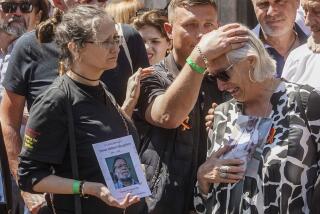London Kidneys-for-Cash Scandal Prompts Action to Ban Sale of Organs
- Share via
LONDON — A government effort to ban trade in body parts was prompted by a kidneys-for-cash scandal at a private London hospital this year.
“The concept of organs being bought and sold for money is entirely unacceptable in a civilized society,” Health Minister Roger Freeman told a House of Commons committee during debate on proposed legislation outlawing organ sales. The bill is expected to pass Parliament later this month.
Not all lawmakers agree.
“The bill will cause death where there could be life, and to prolong suffering where we could provide relief,” said Sir Michael McNair-Wilson, a Conservative Parliament member awaiting a kidney transplant.
Reimbursed for Costs
The legislation will make it a crime to pay or receive payment for a human organ, act as a broker in such transactions, or solicit buyers or sellers. It will, however, permit voluntary donors to be reimbursed for the costs of removing a kidney.
British lawmakers acted after news reports in January that Turkish peasants were paid to donate kidneys for transplant surgery at the private Humana Wellington Hospital. Turkish authorities said donors were paid $3,200 to $5,600.
After the disclosures, Humana Hospital barred two doctors and the General Medical Council, the disciplinary body for British physicians, opened an investigation.
Freeman said a Gallup Poll commissioned in February by the British Kidney Patients Assn. found that 87% of the respondents opposed commercial transactions in human organs.
“Whether they would think the same if faced with the choice of paying for an organ or of one not being available, thereby causing death or prolonged suffering for a member of the family or a close friend, is another matter,” McNair-Wilson said in committee debate.
‘List Is Growing’
“We are discussing a shortage of organs for transplant, particularly of kidneys. The waiting list stands at 3,500 people, but the list is growing,” he said. “Many people are suffering considerable discomfort for long periods. Many people, who could survive if they had a new kidney, die without cause.”
Freeman conceded that donations, which average 1,500 a year, were falling short of demand and noted that health authorities had been ordered to find ways to identify potential donors. The government has also asked health workers to record every death in intensive care and analyze why usable organs were not transplanted.
After publicity about his plight, McNair-Wilson said a woman in Australia wrote to offer a kidney for $20,000. According to McNair-Wilson, the woman said she had lost her home in a fire, had no insurance and was sick of “pulling myself and my children up by the bootstraps.”
Dilemma Posed
Neil Hamilton, who cast the only vote against the bill in committee, said he had pondered the dilemma facing one Turk who allegedly sold a kidney.
“His daughter was suffering from a medical problem which threatened her life, but it could not be solved in Turkey without money,” Hamilton said. “If he did not get the money for the operation, his daughter would die.”
A similar argument for the right to sell organs was advanced by Royden Harrison, emeritus professor of social history at Warwick University, in a February letter to the Times of London.
“What possible objection can there be if one person, of their own free will and without duress, should sell their kidney to someone else?” he asked. “Nor is there any wrong done by the middleman who makes a profit out of this transaction. The seller is able to indulge in a few of the good things in life. The buyer may well be paying to survive.”
More to Read
Sign up for Essential California
The most important California stories and recommendations in your inbox every morning.
You may occasionally receive promotional content from the Los Angeles Times.













